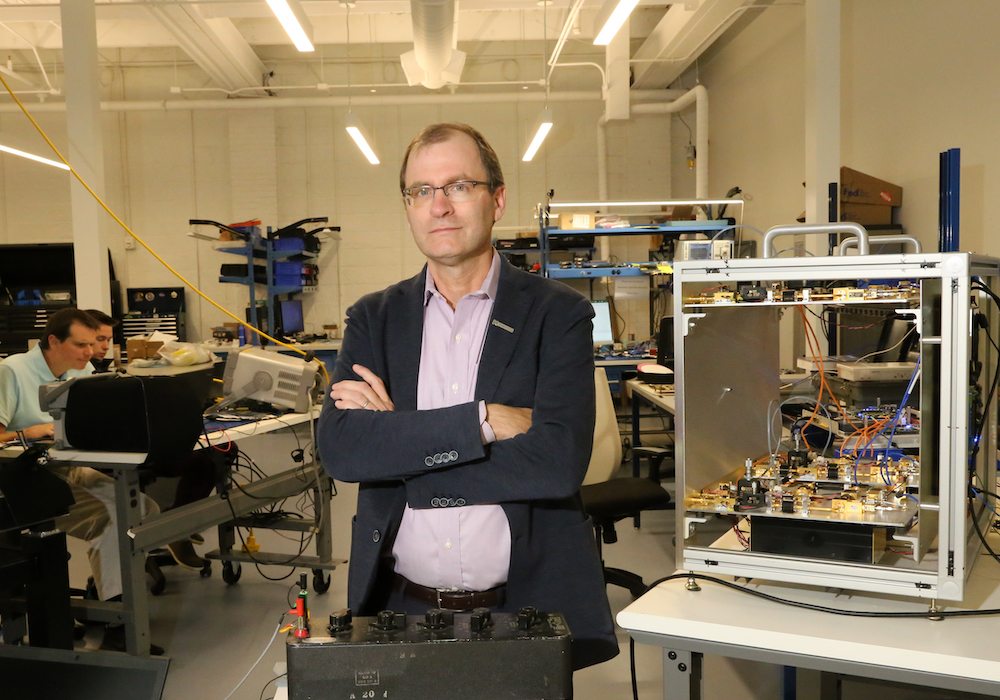Kyle S. Gibson
More posts from Kyle S. Gibson
As humans get used to working at a distance from each other, a startup in Massachusetts is providing sensors that bring industrial robots in close — centimeters away, in fact. The same technology may support future social distancing efforts on commutes, in a pilot application to allow more subway trains to run on a single track.
Humatics, an MIT spinout backed by Lockheed Martin and Airbus, makes sensors that enable fast-moving and powerful robots to work alongside humans without accidents. If daily work and personal travel to work ever go back to normal, the company believes the same precision can improve aging and crowded infrastructure, enabling trains and buses to run closer together, even as we all may have to get used to working further apart.
This is the emerging field of microlocation robotics — devices and software that help people and machines navigate collaboratively. Humatics has been testing its technology with New York’s MTA since 2018, and today is tracking five miles of a New York subway, showing the transportation authority where six of its trains are, down to the centimeter.

UWB sensors for microlocation
Humatics’ technology in the MTA pilot uses ultrawide band (UWB) radio frequencies, which are less failure-prone than Wi-Fi, GPS and cameras.
“A good example of a harsh environment is a subway tunnel,” said David Mindell, co-founder of Humatics and professor of engineering and aerospace at MIT. “They are full of dust, the temperatures can range from subzero to 100 degrees, and there is the risk of animals or people tampering with devices. Working inside these tunnels is difficult and potentially dangerous for crews, also.”
Humatics has sold more than 10,000 UWB radio beacons, the base unit for their real-time tracking system, to manufacturers of sensor systems, the company says. They pinpoint the location of hundreds of RFID tags at a range of 500 meters, using multiple tags on an object to measure orientation.

A multidisciplinary field
Extending this kind of technology into robotics applications is a multidisciplinary endeavor. Humatics is based out of Waltham, Massachusetts. In the same town is Veo Robotics, which makes software used in microlocation for robotics. In an Interview, Bilal Zuberi, a Veo Robotics board member and partner at Lux Capital, said Boston is one of only a few places with a talent pool to support this kind of company. Zuberi ticked off the requirements: mechanical engineering, electrical engineering, computer science, firmware engineering, manufacturing and computer vision.
The talent cluster extends beyond the universities in Boston, he said, mentioning employers like Draper Labs, Raytheon or iRobot. Beyond those established firms, “There is a rich history of successful robotics companies in the area,” Zuberi said, “so many students that leave Boston colleges are eager to work in robotics. Some have already had internships at these companies. There is a natural affinity for almost ‘sci-fi’-like companies.”
Trevor Zimmerman, Humatics board member and managing partner at Colorado-based Blackhorn Ventures, cited Boston robotics companies’ “collegial” approach. “They recognize that there is a degree of ‘precompetitive collaboration’ that’s required for any of them to be successful,” he said. “Think, standards for interoperability. If I was going to start a robotics company, it would be in Boston, because the caliber of the network would improve the probability of success.”
Blackhorn has one other robotics investment in the Boston area, Vecna Robotics, a company that, like Humatics, works on technologies that enable humans and robots to work more closely together.

The microlocation industry and UWB
Microlocation’s applications range from subway tunnels to factory floors to … kind of floor. Brain Corp, a developer of software for autonomous robots, recently closed a $36 million funding round that the company says will help it expand from focusing on floor cleaning robots to more applications like inventory delivery and “shelf analytics.” In Massachusetts’ robotics industry alone, no less than five venture-backed companies on Pitchbook’s regional list of the top firms by valuation are working on systems to allow robots to work in human environments. Three of those, Humatics, Realtime Robotics and Redpoint Positioning, are focused specifically on a variety of sensor technologies.
GPS and camera-based tracking systems have been widely used in private industries like shipping and retail since the late ’90s. Radio frequency-based systems have only become available after that time, in part due to regulation of the radio spectrum.
UWB radio frequencies received approval for commercial use in the United States in 2002. Since then, standards setting organizations like IEEE have created guidelines for how UWB can be safely used for positioning and security applications, such as secure mobile transactions.
Apple announced last September that the iPhone 11 will include the Apple U1 chip — a UWB-compatible RFID tag. Also last year, a consortium named FiRa (short for “Fine Ranging”) was initiated by technology manufacturing companies Assa Abloy, Bosch, HID Global, NXP and Samsung, with the goal of developing interoperability standards for using UWB in tracking and security applications. Humatics has since joined FiRa. Other companies that are offering UWB tracking systems include Estimote, Decawave (owned by Qorvo, Inc.) and Zebra Technologies.
Humatics obtained some of the patents for its UWB technology when it acquired 5D Robotics and its subsidiary Time Domain in early 2018. According to an article in RFID Journal from 2008, Time Domain had by then reduced the cost of manufacturing its chips in two significant ways: by optimizing the product designs to make them mass production-friendly and by increasing the effective range of the radio beacons so customers will require less equipment for full coverage.
Humatics’ next, small step forward
As it builds a business in transportation and manufacturing, Humatics is developing new, more precise systems to measure location at the submillimeter level using radio frequencies distinct from UWB. Potential applications include robotic welding, assembly and automated guided vehicles (AGVs). Mindell says that Humatics is the “first company able to provide submillimeter precision using RF-based tracking.”
For applications in the transportation sector, other criteria besides precision are important, such as cost and installation time. New York state has estimated it would take 50 years to replace all of its wiring for the signaling system; Humatics estimates it would take just 50 months to attain coverage for all New York subway tracks using UWB beacons.
Another potential use Mindell has described is in augmented reality (AR) systems. Today, a system like the Microsoft HoloLens relies on accelerometers and cameras. Mindell says that UWB tracking can “open up AR to be true augmentation” … which would sure make working from home a bit more fun.































Comment